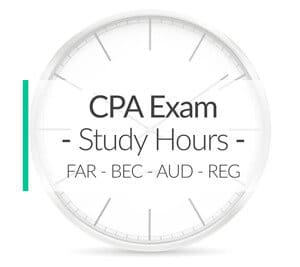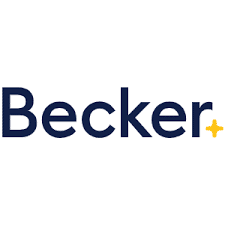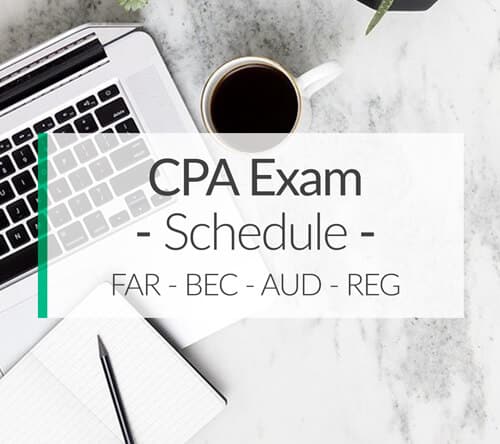
Are you gearing up for the CPA exam and wondering just how many hours you should dedicate to studying? Well, you’re not alone. According to the American Institute of CPAs (AICPA), the CPA exam pass rate hovers around 50%, a statistic that underscores the need for a well-thought-out study plan.
But how much time is enough?
On average, it’s recommended that CPA candidates invest about 300-400 hours in total. This breaks down to roughly 80-100 hours per exam section. But wait, there’s more to it than just numbers.
- 1.Becker CPA Review Course: Rated the #1 Best CPA Review Course of 2025
- 2.Surgent CPA Prep Course: Best Technology
- 3.Gleim CPA Review Course: Largest Question Bank
Ultimately, effective study plans are different for everyone and depend on a variety of factors. Therefore, let’s take a look at a few of them.
Factors Influencing CPA Exam Study Hours
- Educational Background
- Your academic history plays a crucial role in determining your study hours. If your college coursework extensively covered CPA exam topics, you might find yourself at an advantage. However, if you missed out on courses like governmental accounting or internal controls, expect to allocate more time to these areas.
- Time Since Graduation
- The gap between your graduation and taking the CPA exam is also a factor. Fresh graduates might find it easier to recall academic concepts, whereas those who’ve waited might need to refresh their knowledge more thoroughly. The CPA exam is academically oriented, so the fresher your college knowledge, the better.
- Work Experience
- While work experience in fields like tax accounting can give you a leg up for certain exam sections like REG, it’s important to note that the CPA exam is more academically inclined. Practical experience helps, but it’s not a substitute for academic preparation.
Expanding Your Study Strategy
Now, let’s expand our horizon and look at additional aspects that can shape your CPA exam preparation:
- Study Hours by CPA Exam Sections
- Understanding the complexity and content of each section (FAR, AUD, REG, BEC) is vital. We’ll explore how to allocate your study hours effectively across these sections.
- Personalized Study Strategies
- We all learn differently. Whether you’re a visual learner or prefer hands-on experience, crafting a study plan that aligns with your learning style is key. Plus, balancing study with professional or personal commitments requires a tailored approach.
- Common Challenges and Solutions
- From time management to tackling tough topics, we’ll discuss common hurdles CPA candidates face and how to overcome them.
- Leveraging Technology and Study Aids
- In today’s digital age, various technological tools and study aids can streamline your preparation. We’ll delve into how these can be effectively utilized.
- Mental Health and Stress Management
- Preparing for the CPA exam can be stressful. We’ll offer insights on maintaining mental well-being during this intense period.
In the following sections, we’ll break down these aspects in detail, providing you with a comprehensive guide to ace your CPA exam preparation. Stay tuned as we delve deeper into each of these critical areas, ensuring you’re fully equipped for success on your CPA journey.
Get Discounts On CPA Review Courses!

Holiday Sale – $1,350 Off Surgent CPA Ultimate Pass

Enjoy $1,140 Off Becker CPA Pro

Take $1,110 Off Surgent CPA Ultimate Pass

Enjoy $1,050 Off Gleim CPA Premium Pro Course

Take Up to $1,000 Off Becker CPA Pro+

Becker CPA: Interest-Free Payment Plan – Deal

Becker Deal: Save on CPA Single Part Courses

Take $1,500 Off Surgent CPA Ultimate Pass

Get CPA Evolution Ready Content on All Becker CPA Courses – Deal

Becker CPA Advantage Package Now $2,499 – Promo

Enjoy a 14-day Free Trial on Becker CPA Courses
How Long Should I Study for Each CPA Exam Section?
The total number of hours you need study for each CPA exam section varies because each section is a different length, covers different amounts of information, and test you differently. Here are some recommended study times for each exam section.
How Many Hours Should I Study for the FAR CPA Exam?
The FAR section is the longest CPA exam section because it covers the most information and number of accounting topics. It’s no secret. FAR is a beast and requires your full attention and commitment.
The FAR exam includes:
- 90 Multiple-choice Questions
- 7 Task-based Simulations
With the latest updates to the exam, the total testing time for FAR is the same as the other sections, but don’t let that fool you. It’s still just as hard as it used to be.
All that being said, it’s recommended that CPA candidates study for 100-120 hours for the FAR CPA exam section.
CPA Exam Study Tip: Focus on the main topics and concepts. You can’t possibly know everything on the FAR exam. Focus on the main information that is tested.
How Many Hours Should I study for the REG CPA Exam?
The REG section involves a ton of memorization and remembering completely unrelated facts and figures. For instance, why is a standard deduction the current amount? Why are carry backs only allowed for 20 years? They just are and you just need to memorize it.
You can grind your REG studying to a halt with questioning why things are the way they are. Do yourself a favor. Don’t ask why. Just memorize it. 🙂
The REG exam includes:
- 72 Multiple-choice Questions
- 6 Task-based Simulations
Typically, REG is tied with FAR for the lowest pass rates out of any section. It’s a tough exam and you need to put in the time in order to pass it. That’s why it’s recommended to study for 90-110 hours for the REG CPA exam section.
CPA Exam Study Tip: Write down facts you need to memorize. It will help you learn the info way faster.
How Many Hours Should I study for the AUD CPA Exam?
The AUD exam section is pretty academic in nature. A lot of candidates who have auditing backgrounds say that this section is far different from the “real world” of auditing. This difference could be good for people right out of college since they are more familiar with the academic world of auditing than the real world.
The biggest thing that you need to do is familiarize yourself with the different audit letter opinions and all internal controls. This will help you out immensely.
The AUD exam includes:
- 90 Multiple-choice Questions
- 7 Task-based Simulations
Many people struggle with this section because it’s it involves memorizing so many auditing procedures and internal controls that aren’t directly relevant to financial accounting. AUD is also notorious for having suggestive answers where not all the answers are wrong, but some are more right than others. SUPER annoying!
Most experts recommend that you study for 70-90 hours for the AUD CPA exam section.
CPA Exam Study Tip: Memorize the unqualified audit opinion letter. You will need it.
How Many Hours Should I study for the BEC CPA Exam?
The BEC section is widely viewed as the easiest CPA exam section, but that doesn’t mean you don’t have to study. Although it has the highest pass rate out of any exam, only about 55% of candidates pass it each window. That’s not that great.
It used to be the shortest exam, but now it has the same amount of MCQs that REG does. It also includes a written portion where candidates are required to write answers to questions, instructions, essays, or professional memos. The written section is unique with about half of all candidates saying they struggle with it. Here’s how the section breaks down.
The BEC exam includes:
- 72 Multiple-choice Questions
- 3 Task-based Simulations
- 3 Written Communication Simulations
BEC covers some cost accounting and management accounting topics as well as basic economic topics. There isn’t a ton of information covered on this section as compared with FAR or REG, but you do have to give it some respect.
Most CPA review companies recommend that you study for 55-75 hours for the BEC CPA exam section.
CPA Exam Study Tip: Memorize all of the important financial ratios and understand how to interpret them.
How to Reduce the Number of Hours Studying for the CPA Exam
How Many Hours of Study Time Do I Recommend?
Notice in the above sections I didn’t say how long I thought you should study. I simply said how long experts and CPA exam prep course providers typically recommend. I did that on purpose because I wanted to you to compare what they say and what I recommend.
Aiming for a score above 90 on the CPA exam might not be the most efficient use of your time. The primary goal is to pass, and achieving a score in the range of 75, which is the passing mark, to 85 is often sufficient. This approach allows you to focus on understanding the material thoroughly without overburdening yourself.
The key focus should be on passing the exam rather than achieving an exceptionally high score. While a high score is commendable, it does not significantly impact your qualification as a CPA. Your study strategy should be tailored to ensure a solid understanding of the material, aiming for a score that comfortably exceeds the passing threshold.
That being said, I would recommend getting a CPA review course that is right for you and focus on the main topics on each exam. Cut out the excess studying that doesn’t matter. You know what this is. For example, if you just watch the video lectures because it’s a nice break from thinking, it’s probably a waste of time for you. Everyone learns differently and should cut out different things. The point is to optimize your study time.
To optimize your study time, prioritize activities that have the greatest impact on your learning. This includes diligently practicing multiple-choice questions (MCQs), thoroughly reviewing solutions to understand the reasoning behind them, and memorizing key facts and formulas that are frequently tested. These strategies are proven to enhance retention and understanding, leading to more efficient study sessions.
By focusing on these high-impact study methods, you can potentially reduce your study time to around 80 hours per CPA exam section. However, remember that this is an estimate and individual needs may vary. It’s important to assess your own understanding and comfort with the material, adjusting your study hours accordingly.
With a more focused and efficient study approach, you may find that topics which previously took 2 hours to understand can now be grasped in 30-45 minutes. This efficiency comes from targeted learning and understanding your own study habits.
Keep in mind, everyone is different and learns things differently. The important thing is that you are productive in your study sessions.
Selecting a CPA review course that aligns with your learning style and study needs is a crucial step. Once you’ve found the right course, commit to your study plan with focus and determination. Remember, every candidate’s journey is unique, so tailor your approach to fit your individual learning style and life circumstances.
Conclusion
Preparing for the CPA exam is a journey unique to each candidate. While the recommended study time is around 300-400 hours in total, or 80-100 hours per section, it’s crucial to remember that these are averages. Your personal study plan should be tailored to your learning style, educational background, work experience, and life circumstances.
By focusing on high-impact study methods, understanding the material deeply, and choosing the right CPA review course, you can optimize your study time and approach the exam with confidence. Remember, the CPA exam is a significant milestone in your professional journey, and how you prepare for it can set the tone for your future career in accounting.
FAQs
Yes, many candidates successfully balance full-time work with CPA exam preparation. It requires disciplined time management and a consistent study schedule, often involving early mornings, evenings, or weekends dedicated to studying.
Choose the section that aligns best with your strengths or current knowledge. Some candidates prefer starting with the most challenging section (often FAR) to get it out of the way, while others choose to start with a section they feel more confident about to gain momentum.
Begin by refreshing your foundational knowledge in accounting and finance. Consider enrolling in a refresher course or using CPA review materials that start with the basics. It’s also helpful to join study groups or online forums for additional support and motivation.
Most CPA review courses offer practice exams that simulate the actual test environment. Regularly taking these practice exams and scoring consistently above the passing threshold is a good indicator of readiness. Also, pay attention to your comfort level with the exam topics and question formats.
It’s possible, especially if you have a strong background in the exam topics. However, it’s important to assess your understanding and adjust your study hours to ensure you’re fully prepared.
On average, it’s recommended to study 80-100 hours per section. However, this can vary based on your familiarity with the material and learning style.













